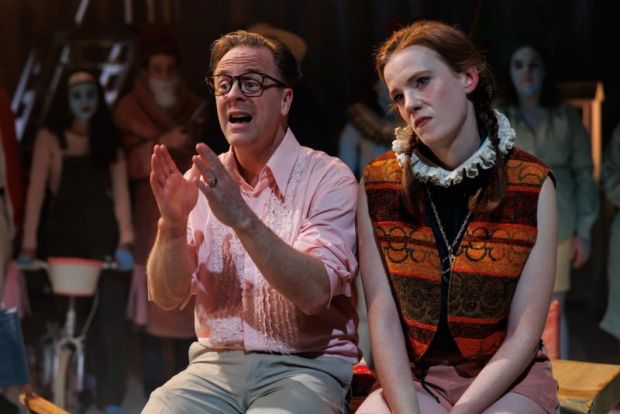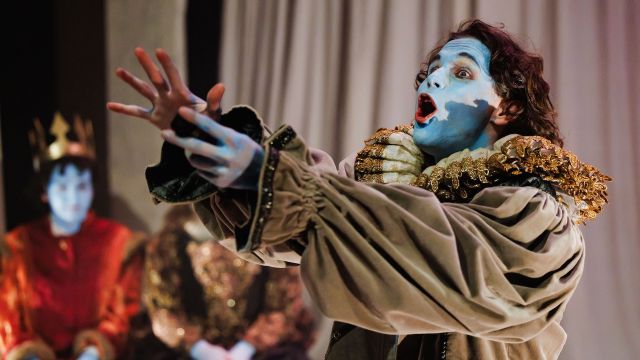Away
Michael Gow’s AWAY, penned in 1986, is set during the Vietnam War, at the end of the 1967school year. Australia was an evolving society, ushering in a new era with a rise in migration and plenty of employment, while redefinition of class and wealth became de rigueur in older Australians. Director Stephen Mitchell Wright has offered an ambitious oneiric and farcical interpretation of Gow’s tragedy/comedy.
As audiences are taking their seats, an ensemble of blue-faced Collart students perform A Midsummer Night’s Dream; the official play begins with the end of Shakespeare’s play, performed as an end of year show at the local high school to kick start the Christmas Holidays. The adventurous Wright has made use of the Shakespearean metadrama device of the “play within a play”, utilizing the chorus ensemble - including costume and set design (Greg Carroll) as a dreamlike bubble that circumnavigates Gow’s play.

Tom (Rupert Bevan), in remission from leukemia, is the lead actor in the school play. His parents Harry (Iopa Auva’a) and Vic (Stephanie Falasca) are proud working-class English immigrants. He strikes up a romance with his co-star Meg (Cait Spiker). Her parents Gwen (Eleanor Howlett) and Jim (Justin Hosking) are snobs with high hopes. Gwen catches Tom and Meg flirting at the end of the show, later admonishing Meg for mingling with the lower classes and relates some home truths about her climb out of poverty. Meanwhile, the aging school principal Roy (Stephen Tall) and his ditzy medicated wife Coral (Linda Cookson) are still grieving their only son, killed in the war.
Wright has cast a bunch of vibrant actors who offer energetic and idiosyncratic characterisations. Gwen (Howlett), born during the Depression Era - perpetually puffing on her cigarettes and crowding her space with superfluous smoke and banality - hen pecks her husband on Christmas Day for leaving behind her Xmas present, while on their annual summer caravan holiday.

Gow’s Away is at times heart wrenching, interweaving many tales while reflecting on change during a tumultuous time. Youth and death are harrowing difficult to address themes. Wright treads lightly with poignant precision.
Tom (Bevan) knows he is dying and wants to pack in life’s pleasures; he grapples with Meg (Spiker), urging sex, but she is reticent to give herself to him. There is a flimsy pathos in this scene that is disturbingly wrought.
Coral’s (Cookson) anguish appears satirical. She flees from her husband to find solace and love with strangers, bedding a young newly wed to compensate for the loss of her own son and escape the entrapments and threats by Roy (Tall) to treat her depression with electroshock.

Wright has offered his audiences a nostalgic hyperreal show that is challenging and different from the norm. It offers though-provoking entertainment encased in aesthetic quirkiness.
Flora Georgiou
Photographer: Daniel Rabin
Subscribe to our E-Newsletter, buy our latest print edition or find a Performing Arts book at Book Nook.

